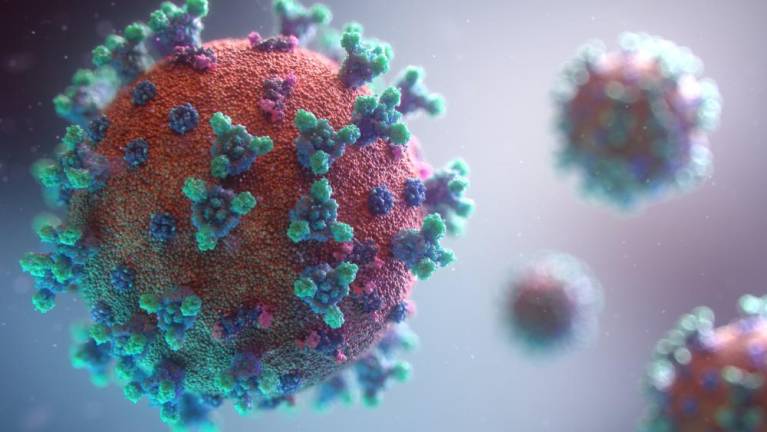Local infectious disease specialist gives the 411 on boosters, infection rates
Dr. Donald Thomas Allegra, Newton Medical Center’s Head of Infectious Diseases and former Endemic Intelligence Service Officer for the Centers for Disease Control, answers questions about COVID-19 boosters, how to gather safely over the holidays, and Sussex County’s current infection rate.


Why is it important to get the booster shot?
Only about 20% of population of the United States has had their third shot or their booster and it really appears to be essential.
We do know that the antibody wanes with time, and after six months you should get a booster anyway.
But with the new variant, there’s two studies out now showing that the Pfizer efficacy in preventing disease only about 20 to 30 percent – but if you get the third dose, the booster, it goes back up to 90 percent.
Is a booster just a third dose – or does it have a different “formula”?
For Pfizer you’re getting a third dose, same one you got for the first two.
For Moderna, they found that all you need for a booster is half the dose, so we’re giving half the doses of Moderna.
And for J&J, it’s the same dose again.
Can I really get any booster shot – is it safe or better to mix? Or is it recommended that I get the same brand booster that I got for the original COVID-19 vaccination?
If you’ve had the J&J vaccine, there are some small studies showing that if you get one of the other two vaccines that are approved (either the Pfizer or the Moderna vaccines which are messenger-RNA vaccines) that the antibody response is improved over getting a second Johnson & Johnson vaccine. So in that case, if you had J&J first, I would get one of the messenger-RNA vaccines.
Most people have had either Pfizer or Moderna, and I don’t think there’s any advantage of mixing and matching there – I would just get the same one, because there’s very little difference.
When should I get my booster?
Right now the recommendation is that you get it six months after your second vaccine (for Pfizer and Moderna).
With the J&J vaccine, they’re saying two months after your J&J, you can get your second dose.
Where can I get the booster?
There’s plenty of vaccine available, and there’s plenty of appointments. So you can go to a Walgreens, Atlantic Health, go on a website and make an appointment. There’s plenty of opportunities; there’s no shortage of vaccine like there was a year ago when we started this.
Should my doctor check my antibody levels to determine if I really need the booster yet? If yes, how many antibodies is considered “low” or “at-risk”?
That’s a good question – I have a lot of people who are getting antibody levels done.
But we really don’t know what the correlate of protection is; that means, what level of antibody really protects against disease. Also, the immune system is very complicated. It’s not just antibodies, it’s these other cells in the blood called T-cells, which are part of the immune system and can protect you against disease.
Since we don’t know what the level (of protection) is, I don’t think it’s worthwhile to continuously, every month check yourself to see if it falls below a certain level.
If I had COVID-19 and haven’t been vaccinated, how long should I wait until I get the first dose?
If you look on the CDC website, it will say immediately after, as soon as you recover, you can get vaccinated.
Because people have a good antibody response to natural infection, I usually have them wait one to three months after their illness before I ask them to be vaccinated.
If I got COVID-19 after vaccination, how long should I wait until I get the booster?
Same thing. Until you’re feeling better is what the CDC says. I usually wait one to three months to get the vaccine just because it takes a while to get over the infection, and I also find that people are going to be protected after they’re infected for at least three months.
What side effects can I expect from the booster?
It should be about the same side effects that you may have had from the second dose (or initial J&J dose): usually a fever, head ache, muscle aches, flu-like symptoms. Most of the side effects last one to three days and then they disappear.
A lot of people are saying these vaccines were pushed through at warp-speed, we don’t know the long-term consequences, etcetera. But most vaccines, if you’re having side effects they usually occur within four to six weeks. And we’re way beyond four to six weeks ... we’ve had this vaccine around for a year now. So we do know a lot about the side effects.
Also, it’s been given eight billion times around the world, so I would say that ninety percent of the drugs in the hospitals that I give to my patients have not been studied eight billion times. So we do have an awful lot of experience with it. So the argument that “I’m not going to get the vaccine until we have more information,” it really doesn’t hold water.
I think the risk of side effects is much less than getting the disease and having a serious complication. Even if you’re young and healthy and get the disease, we’re still seeing about 10% of the people who get what’s called long-hauler symptoms: that means when you get brain fog, muscle aches, fast resting heart rates, shortness of breath. It sometimes persists for a year, and it’s not a benign disease: even in healthy people who get these long-hauler symptoms.
Do you have any advice for how to gather safely over the holidays?
It depends upon what your risk-tolerance is. There is no perfect risk-free life. Even driving home tonight from the hospital – I’m not sure I’m going to make it. I hope I make it. But, you know, there’s always a risk to that. It’s almost the same with gathering together for the holidays.
When it comes to gatherings, it’s a difficult situation to actually define what is best-for-all. It sort of depends upon what the level in the community is: and in our communities we have a fair amount of COVID right now, so the risk is higher.
I think people can get together for the holidays, but I would probably recommend that everybody who gets together gets vaccinated. And if anyone has any symptoms at all they should get tested before going to the gathering.
Tell me about what you’re seeing now in Sussex County in terms of COVID-19 infections
We’re really having a problem right now in Sussex County because our initial vaccination rate is very low. We’re the fourth lowest in the state, and we have the second highest population infection rate in the State of New Jersey. We’re only second to Warren County, which we’re just neck-in-neck with.
The Middle Atlantic states, New England and the upper Midwest are now seeing a new surge and we’re part of that. So hospitalizations, cases, everything is way up in the last three or four weeks; we had Thanksgiving, a major holiday, we’re coming into Christmas now. We’re all indoors now, doing more activities where everybody’s having COVID fatigue and don’t want to wear masks, social distance...
We’re not at the point where you’re watching on TV and the National Guard is being called in and we’re denying people . . . We’re not at that point yet. But we’re much higher than we were this summer.